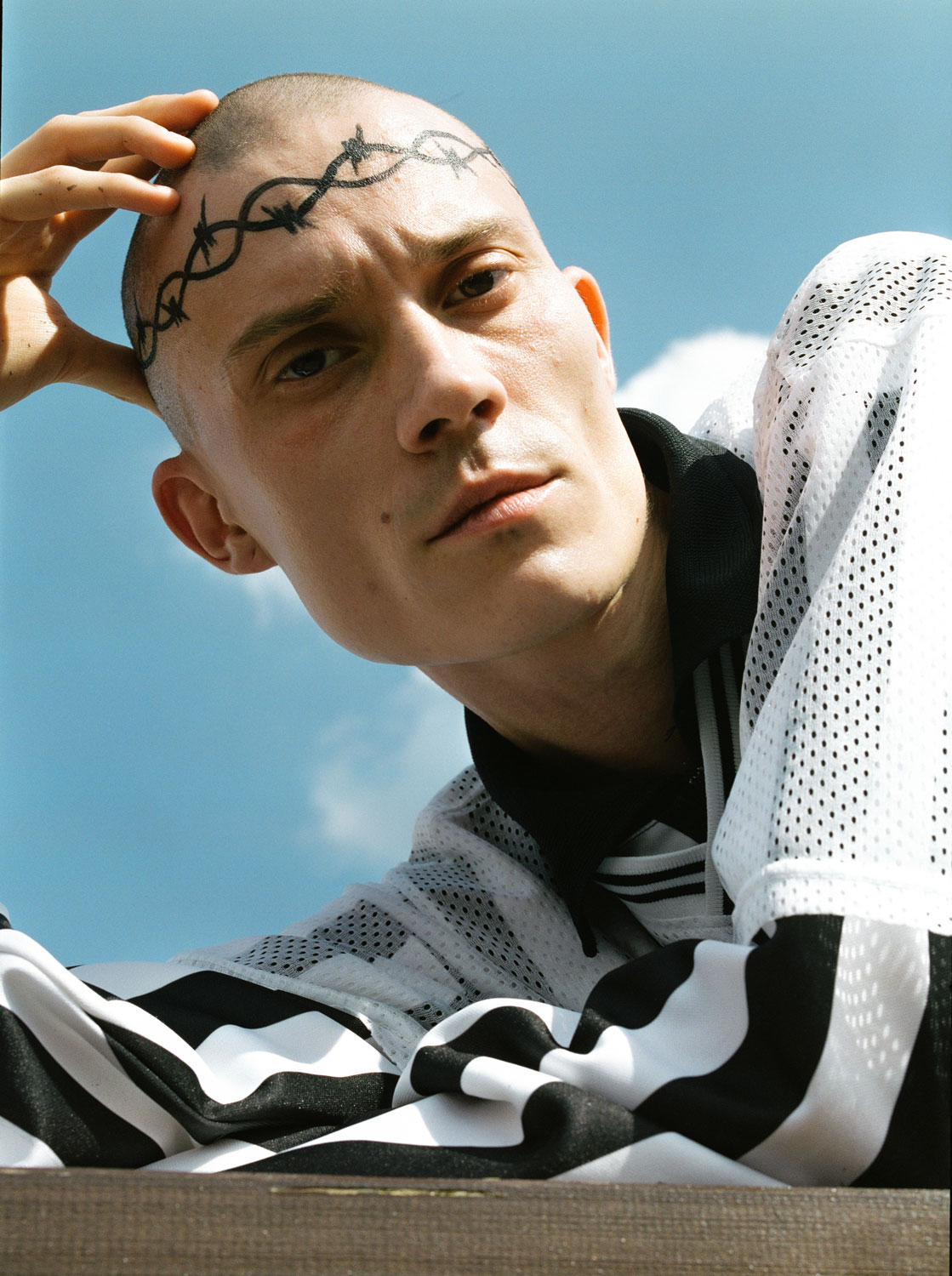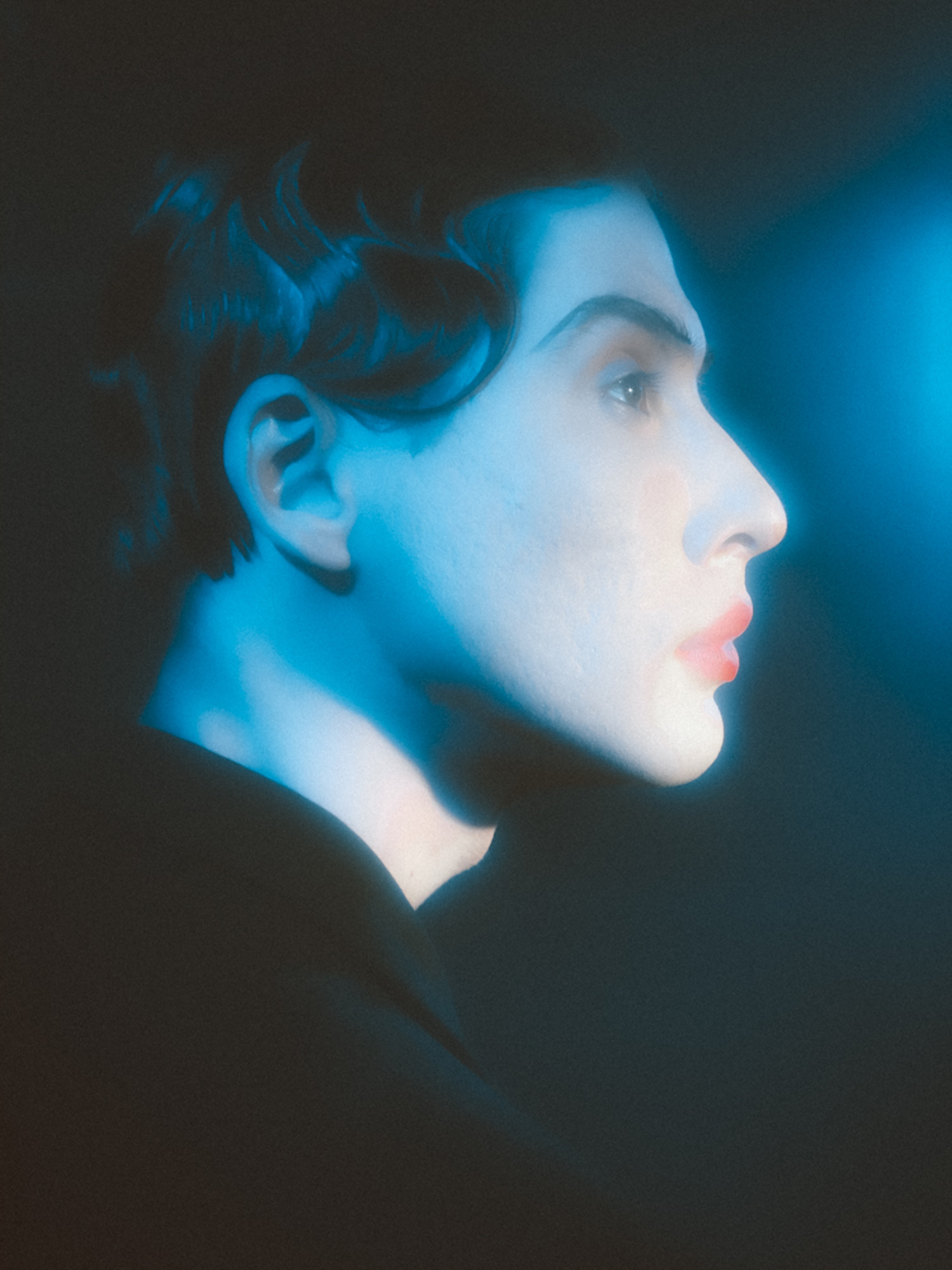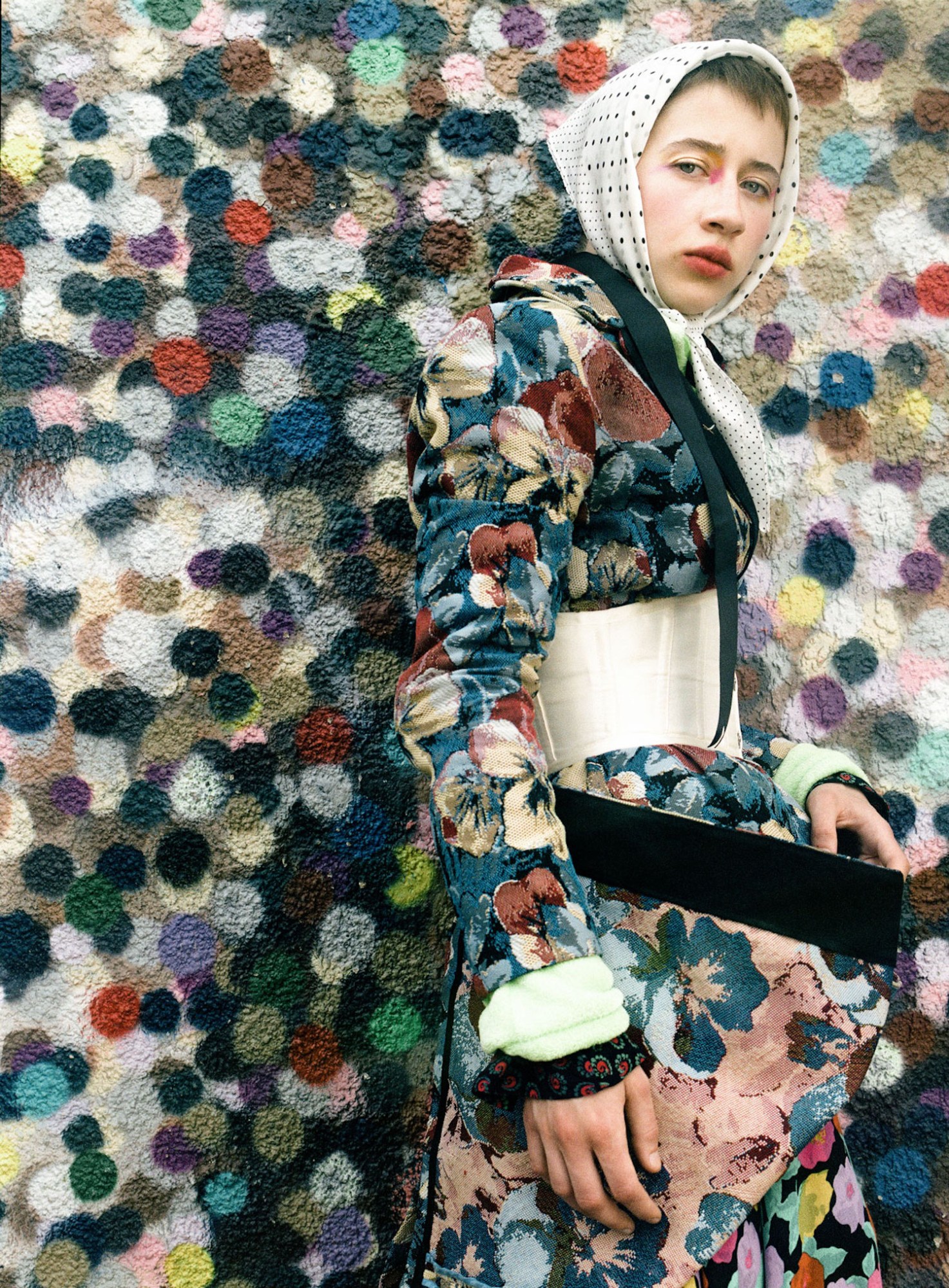The city of Norilsk is located above the Arctic Circle in Russia’s north. With just under 200,000 inhabitants, it’s known as a harsh, industrial place, its history shaped by extensive mining of nickel and copper and its Soviet-era prison camps. It’s not a place you’d associate with dreams of a music career — and it’s not a place where it’s easy to be queer. Yet it remains a source of inspiration for non-binary singer-songwriter Augustine, whose debut single “Papa Sever” (Russian for “Father North”) is a poetic dedication to her hometown.
“The song is about Norilsk, a special place of power and inspiration for me,” Augustine explains. “There are no roads leading into the city — you can only reach it if you are a bird. The lyrics are born from my sorrow, and the song is born through my cries. At first, it was supposed to be a ballad, but I wanted to make it more life-affirming. I wanted everyone to dance with me to this Northern cry”.
Aged 22, Augustine could sense she was different since early childhood — and later came out as non-binary. Her sensual dreamy voice is pleasurably hard to place on the gender spectrum, and her songwriting is ridden with metaphors and mythical creatures, such as mermaids — tropes especially attractive to queer creatives who have trouble fitting into an ordinary reality.
Augustine’s video for “Papa Sever”, directed by Artem Emelyanov, channels the ephemeral and dazzling world of 1980s cult pop music, with role models like Kate Bush and Prince. It’s a dream come true, a hymn to queer outsiders — and it’s as much about community as it is about the music. All the production expenses were crowdfunded by O-zine, a DIY publication about Russian queer culture, which raised £800 in just four days — all thanks to queer supporters and allies. It shows that Russia’s young LGBT+ community is keen to be represented — and that the new wave of queer musicians in the country are the ones to whom they’re keen to entrust this mission.
Russia is an undeniably hostile place for LGBT+ folk, who live under the constant threat of direct violence in the form of attacks, harassment and discrimination. But there’s also an indirect violence involved — the refusal of representation. Under the infamous “gay propaganda law” passed in 2013, there is legally no space for queer voices in the mainstream media or public sphere. Undeterred by this, however, members of this new generation are keen to create spaces where they can thrive — often online. Founded in 2018 by Dmitry Kozachenko and Sasha Kazantseva as a space for queer Russian youth to showcase their creativity, O-zine is one of them.
“I think Russia has always had great queer musicians, but they were more cautious about being openly queer” says Dmitry. ”With the rise of social media, especially Instagram, hundreds of openly queer bloggers emerged, and young musicians started speaking out too. It’s clear that it’s important for them to be incredibly open with their audience. The main themes for Russian LGBT+ musicians are love, intimacy and feelings. When society and the state claim that your love is ‘not normal’ and you can’t show it anywhere, it results in a quiet protest”.
Protest, however, is not always so quiet. One of its finest and most outrageous examples is Angel Ulyanov’s “Davai Zamutim” video from 2019. We follow a group of tracksuit-clad lads through bleak urban surroundings — with their buzzcuts and Adidas stripes, they project the threat of violence so often coded into the concept of Russian masculinity. When they encounter a neon-haired singer in a deserted underpass, we naturally expect confrontation. Here, though, violence is replaced with voguing — the original fearlessness of a culture born in the ballroom scenes of NYC becomes a power which dismantles homophobia. Through his own radical expression of masculinity, Angel, who is openly gay, aims to create music that transcends the boundaries of the queer community — and that seeks to dismantle those that lie beyond it.
An artist that muses on confronting harsh realities in a more gentle way is Hristina. In the video for “Slova” (Russian for “Words”) we see a desolate place, somewhere between a building site and a dystopia, which gradually becomes a space of love, touch and affection beyond age or gender. Identifying as non-binary, they see their identity as crucial to their creative process — their debut album, for example, was dedicated to all the women they ever loved. But it goes deeper than that. “My queerness is definitely important for my creativity. In my songs I share my emotions and thoughts which are often connected to love, relationships and childhood memories,” they admit.
Those that make up this new wave of Russian queer music are indisputably courageous — something seen not only in their sharing of feelings condemned by society, but also in acting, in a way, as the face of a wider queer movement. Slava Rusova of duo SVRNY exposed her own romantic relationship with her ex-girlfriend in the video for her single “Tired”. Was she scared to be that open? “It made sense. I am queer. I sing about being queer. So the video had to be queer. Representation is important, and we wanted to make this video our activist statement, our: We’re here. We’re queer. Get used to it.”
At the same time, certain queer musicians rely much more on performance and theatrics — tools to expose the surreality of their oppressed existences. Band Shortparis fuses experimental post-rock with theatre, poetry, performance art and sensual choreography; staging visual discussions of toxic masculinity, rigid gender stereotypes and violence in Russian society. Originally from St Petersburg but based in Berlin, Sado Opera is another example of an act that weaponises performance in its fight for equality. “Sado Opera is a ‘techno-fairytale’. We are a queer music band performing live in makeup and costumes. Our music is a mixture of disco, house, funk, and electro. And we speak a lot about inclusivity, freedom, visibility, and sexuality,” they explain.
Contemporary Russian queer music doesn’t subscribe to a single genre: it rages from experimental post-rock and indie to avant-pop and more club-influenced sounds. In its fluidity, it aptly reflects the young members of the country’s LGBT+ community, whether found in the intimate safety of their bedrooms or underground gatherings at queer-friendly bars, gigs and raves. Perhaps the largest of its sort in the country, Moscow’s queer rave Popoff Kitchen, started by Nikita Egorov-Kirillov in 2016, has played a significant role in providing a physical space to experience a queer techno subculture, not unlike London’s Chapter 10 or Berlin’s Herrensauna.

“I wouldn’t call Russian queer music scene big yet, but it’s definitely growing,” says Nikita. ”LGBT+ artists are starting to appear, and they are young and open. A few years ago, it would have been hard to even imagine things as they are now. I like and follow Shortpartis and Angel Ulyanov. And as for the DJs, I would mention Popoff Kitchen residents Kirill Shapovalov and Raumtester, who play in Europe often, as well as Nastia Reigel from St Petersburg.” The latter is also the co-founder of Grahn, the city’s much-celebrated queer rave, as well as the face behind post-industrial, post-punk and noise music alias Rosa Damask. She points out that music and club spaces are part of something much bigger — a much-strived-for ideological shift: “I try not to think about myself within any genre or identity boundaries,” Nastia says. “I think what’s truly important is that everyone feels comfortable, free and respectful towards others.”
This new wave of Russian queer music is only starting to emerge but, if what has been produced thus far in hostile circumstances is anything to go by, it surely has a bright future. Moreover, listening to these tunes is probably the best way to understand not only its LGBT+ community but the more general nature of navigating Russia as a young person, an experience coloured by fear and vulnerability, courage and love in the face of oppression. Here, every little thing, however mundane, can be claimed as a source of inspiration. “My grandmother’s pearls, a scratched knee, an open window, a trash bin — all of these things have the power to get me out of bed and compose a symphony”, says Augustine. “Music is key to my queer expression, a way to talk about my gender identity. It’s my superpower”.

Want to support Russia’s new wave of queer creatives? You can do so by subscribing to O-zine’s Patreon.
Credits
Photography Artem Emelianov


